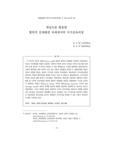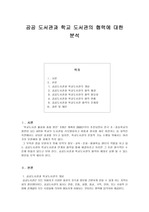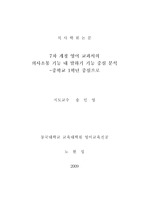

-
 * 본 문서는 배포용으로 복사 및 편집이 불가합니다.
* 본 문서는 배포용으로 복사 및 편집이 불가합니다.
미리보기
서지정보
· 발행기관 : 한국교육공학회
· 수록지 정보 : 교육공학연구 / 21권 / 2호
· 저자명 : 류지헌, 권숙진
목차
Ⅰ. 개념도와 협력학습
Ⅱ. 협력 학습에서의 인지과정
Ⅲ. 연구 방법
Ⅳ. 분석 결과
Ⅴ. 논 의
참 고 문 헌초록
이 연구의 목적은 개념도(concept map)를 활용한 협력적 문제해결 과정에서 학습자들이 서로의 지식체계를 어떻게 공유하기 위하여 어떠한 인지적 과정을 거치게 되는가를 탐색하기 위한 것이다. 이 연구의 대상은 두 명의 대학생으로 구성된 협력학습 집단이었으며, 10개의 협력학습 집단 중에서 서로 다른 유형의 산출물을 제시한 두 집단(복제형 개념도 집단과 혼합형 개념도 집단)의 지식공유 과정을 비교하였다. 학습자들의 지식공유과정을 분석하기 위하여 협력과정을 촬영한 비디오 자료 및 개념도가 활용되었으며, 근거이론에 의하여 자료에 대한 분석이 시도되었다. 학습자들은 개념도를 사용하여 개별적인 과제수행을 한 이후에 논의과정을 통하여 협력적 문제해결 과정을 수행하였다. 지식을 공유하기 위해서는 개념의 정착(concept fixation), 의미의 협상(meaning negotiation), 지식의 조율(knowledge tuning)의 과정이 복제형 집단과 혼합형 집단에서 공통적으로 일어나는 것으로관찰되었다. 그러나 복제형 집단은 일방적인 지식의 전수과정을 보였으며, 혼합형 집단에서는 밀도있는 상호작용이 발생했던 것으로 나타났다. 이는 지식공유를 촉진하기 위해서는 학습자들의 상호작용을 높이고 상대방의 지식구조를 탐색할 수 있는 기회가 제공되어야 함을 시사하고 있다.영어초록
The purpose of this study was to identify the knowledge sharing process in a collaborativeproblem solving task with a concept map. Ten pairs of college students participated to acollaborative problem solving task that was to generate a concept map to arrange fifteenconcepts from the subject matter of "Instructional Design Process". They were asked to generate an individual concept map first and work together to make a collaborative concept map. Among the pairs, two groups were selected for this study. The selected pairs showed totally different concept maps, which were assumed that they collaborated together in different ways. By comparing different collaborative pairs, it would be easier to identify how the collaboration would be performed differently and what were the similarities between them. One pair was labeled as a duplicated concept map group that seemed to make a collaborative concept map like a duplication of one member's individual concept map. The other pair was labeled as a blended concept map group that made a collaborative concept map as reflecting unique features from each individual concept map. The main data resources of this study were video records of collaboration, concept maps, and transcriptions ofparticipants' collaboration. Grounded theory was applied to qualitatively analyze the verbal data of collaboration, and frequency analysis was employed. The data analysis revealed that there were three stages of sharing knowledge in common: 1) concept fixation, 2) meaningnegotiation, and 3) knowledge tuning. The concept fixation was to fix the definitions of concepts. The meaning negotiation was to decide the relationships between concepts. The knowledge tuning was to externalize the structureof concepts collaboratively negotiated meanings. However, it was identified that the two groups had different interactions between members. For the duplicated concept map group, there was less interaction rather unidirectional communication between members while the blended concept map group showed intensive interactions. It was speculated that the duplicated concept map group performed a knowledge telling process though the other group performed knowledge transformation. The result of delayed test of generating an individual concept for the two groups showed that the blended concept map group generated exactly the same concept map comparing with their collaborative concept map. However, the duplicated concept map group showed inconsistent concept maps to their collaborative concept map. The result of this study proposed that promoting dynamic interactions between members will facilitate the knowledge sharing between members. It was also suggested to help learners to explore other learners' knowledge structure to improve knowledge sharing between them.Key words : Concept map, Shared mental model, Collaborative learning, Knowledge sharing, Problem solving참고자료
· 없음태그
-
자료후기
Ai 리뷰지식판매자가 제공한 자료는 정보가 풍부하고, 내용이 명확하게 정리되어 있어 과제를 작성하는데 큰 도움이 되었습니다. 매우 추천할 만한 자료입니다! -
자주묻는질문의 답변을 확인해 주세요

꼭 알아주세요
-
본 학술논문은 (주)학지사와 각 학회간에 저작권계약이 체결된 것으로 AgentSoft가 제공 하고 있습니다.
본 저작물을 불법적으로 이용시는 법적인 제재가 가해질 수 있습니다. -
해피캠퍼스는 구매자와 판매자 모두가 만족하는 서비스가 되도록 노력하고 있으며, 아래의 4가지 자료환불 조건을 꼭 확인해주시기 바랍니다.
파일오류 중복자료 저작권 없음 설명과 실제 내용 불일치 파일의 다운로드가 제대로 되지 않거나 파일형식에 맞는 프로그램으로 정상 작동하지 않는 경우 다른 자료와 70% 이상 내용이 일치하는 경우 (중복임을 확인할 수 있는 근거 필요함) 인터넷의 다른 사이트, 연구기관, 학교, 서적 등의 자료를 도용한 경우 자료의 설명과 실제 자료의 내용이 일치하지 않는 경우
“교육공학연구”의 다른 논문도 확인해 보세요!
-
사이버대학에서의 강의평가와 학업성취에 관한 사례연구 24 페이지
본 연구는 사이버대학에서 교과목에 따라 강의평가의 결과가 어떠한 차이를 보이는 지 밝히고, 강의평가를 학생 자신의 학습충실도, 교수 및 강의운영 충실도, 시험 및 과제에 대한 견해, 강의 컨텐츠에 대한 견해, 그리고 운영시스템에 대한 견해로 구분하여 강의평가가 학업성취에 미치는 영향을 살펴보았다. 본 연구는 서울 소재 사이버대학에서 2004년 1학기에 실시.. -
멀티미디어 학습 환경에서 학습자 특성별 인지부하 효과 24 페이지
본 연구의 목적은 인지 부하의 관점에서 효율적인 교수설계가 어떠해야 하는지를 밝히기 위함이다. 따라서, 멀티미디어 학습 환경 하에서 내재적·외재적 인지 부하가 학습자의 과학 지식 이해와 전이에 미치는 효과를 조사하고, 인지부하의 수준이 높은/낮은 교수 설계와 학습자 개인 특성간의 상호작용 효과를 분석하였다. 본 연구에는 257명의 중학생들이 실험을 위한 4.. -
웹 게시판을 활용한 협력적 문제 해결 학습 과정 분석 18 페이지
본 연구의 목적은 순차 분석 방법 (Sequential analysis)을 적용하여 웹 기반에서 협력적 문제 해결 학습 과정을 분석하는데 있다. 특히, 서술적인 빈도 분석, 단계별 변환 확률 분석, 변환 상태 도식, 유의도 검사 등을 활용하여 협력적 문제 해결 학습의 단계별, 단계들의쌍, 연속적인 과정 등을 분석 제시하였다. 연구 결과, 빈도 분석의 경우 .. -
온라인 학습공동체에서 학습자 특성, 학습자간 상호작용, 학습결과 간의 관계 분석 28 페이지
본 연구는 온라인 학습공동체에서 학습자 특성, 학습자간 상호작용, 학습결과 간에 상호관련성이 어떻게 나타나는지를 규명하기 위한 목적으로 수행되었다. 연구를 위해 온라인학습공동체에 참여하여 활동하는 중학교 1∼2학년 학생 24명을 대상으로 사회과 통합학습과제를 가지고 4주 동안 수행하도록 하였다. 사전지식 검사지, 언어·대인·자성지능 검사지를 활용하여 네 가.. -
웹 기반 교수-학습 관련 변인이 학습 효과에 미치는 영향에 대한 메타분석 26 페이지
본 연구의 목적은 메타분석 기법을 통해 웹 기반 교수-학습 관련 변인이 웹 기반 교수-학습 효과에 미치는 효과크기를 분석하는 것이다. 연구의 수행을 위해 웹 기반 교수-학습 관련 변인을 학습자, 교수자, 학습 내용, 학습 방법, 학습 환경 등 크게 5개로 통합 분류하였으며, 종속변수로는 웹 기반 교수-학습 효과로 설정하여 메타분석을 수행하였다. 분석 대상 ..
찾으시던 자료가 아닌가요?
지금 보는 자료와 연관되어 있어요!
문서 초안을 생성해주는 EasyAI







